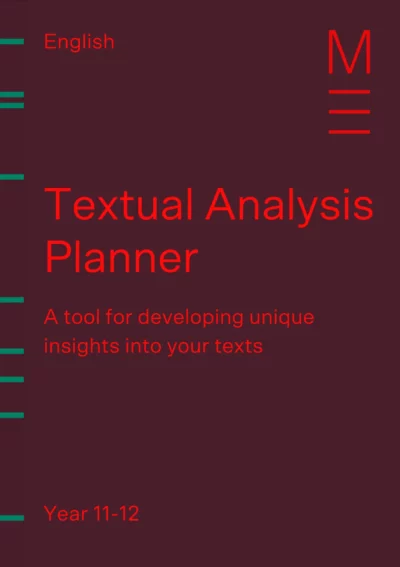Welcome to Matrix Education
To ensure we are showing you the most relevant content, please select your location below.
Select a year to see courses
Learn online or on-campus during the term or school holidays
Learn online or on-campus during the term or school holidays
Learn online or on-campus during the term or school holidays
Learn online or on-campus during the term or school holidays
Learn online or on-campus during the term or school holidays
Learn online or on-campus during the term or school holidays
Learn online or on-campus during the term or school holidays
Get HSC Trial exam ready in just a week
Get HSC exam ready in just a week
Select a year to see available courses
Science guides to help you get ahead
Science guides to help you get ahead

Guide Chapters
In this article, we look at the processes successful students follow to do well in their English assessments.
Do you know how to prepare for English assessments? Students often ask us how to study for English for the HSC and Year 11. Different assessment tasks require different study approaches, and this can be stressful if you don’t know how.
In Part 5 of our Beginner’s Guide to Acing HSC English, we’ll give you an overview of useful study practices for a complete range of assessment tasks you’ll face throughout Years 11 and 12.
Download a free textual analysis planner to start writing insightful essays!

Level up how you analyse texts and take notes with expert strategies and templates!

Fill out your details below to get this resource emailed to you.
"*" indicates required fields
School assessments are very important as they have a cumulative effect on your mark. If you aim to score Band 6 for English, you need to be scoring 90% or above from the first assessment task you complete.
To achieve this, you need to prepare appropriately for each type of task. If you want an overview of what tasks you might be asked to do or how assessment notifications work, read Part 4 of this guide, notifications and assessment tasks.
It pays to be thorough when preparing for English assessments, and this means studying specifically for the task you have at hand!
Before you begin preparing for a specific task, you need to have detailed textual analysis and study notes. If you need help with analysing your text, be sure to read Part 2 of this Guide: Textual Analysis – How to Analyse Your English Texts for Evidence.
Let’s have a look at appropriate study methods for the different tasks you may encounter in Year 11 and 12.
Oral tasks come in the following forms:
Panel discussions and interviews are becoming increasingly popular with some schools. Remember, in Year 11 and 12, you will now have to give a multimodal presentation. Let’s look at some broad preparation strategies.
Viva Voce exams are oral exams. An examiner will pose a series of questions. This is like a thesis defence at university. You must demonstrate thorough knowledge and mastery of your subject. Preparing for these is made easier as, unlike at university, your teacher will provide you with a list of questions that they may ask you. They will usually ask three or four questions.
When preparing for these tasks you should:
A common mistake students make when preparing speeches is to draft, and then redraft, a speech but not practise it.
When preparing for speeches you should:
Interviews are group work. This means that you must not fall into the trap of having the interview subject do all the work. Interviews are also performance pieces, you need to rehearse them as you would a speech. It is important that both the interviewer and the interviewee contribute to the performance.
Don’t:
Do:
Panel discussions combine the principles of speeches, interviews, and viva voce examinations. Each panel member needs to prepare a speech. But as a whole, they should practise their individual roles. When they are asked questions, they need to function as a group. A good panel will help each other out when one member is stuck or being grilled. Some things to do are:
In Part 10 of this Guide, we will discuss Multimodal Presentations in detail and give you a step-by-step process for preparing for them. This part of the guide will give you practical tips that will help you with all of the assessment types above!
Listening tasks are difficult to prepare for. They can come in a variety of forms: short answer questions, essay responses, or creative response. Preparing for these can be difficult, too. Some rules of thumb to follow are:
Not everyone is visually minded, so visual tasks can be very intimidating. But visual representations of ideas are good ways to train your mind to conceptualise themes or ideas. Students are often asked to produce a collage or visual representation of the ideas they have encountered in a Module or text. Students are often unsure of how to approach these tasks. Let’s look at some handy guidelines:
Creatives are tasks that students must produce in Year 11 and Year 12. It is important that students should practise producing creatives. In addition, rather than producing one perfect creative in their HSC year, you should aim to produce at least two if not three so you have several options for the stimulus you are presented with.
You can find detailed advice on writing creatives for Year 11 and Year 12 in Part 8 of this Guide. Additionally, you should read these blog posts we’ve put together for you on creative writing:
Essays are a large part of Stage 6 assessments. You will have to write four essays during the HSC exams for Advanced English, and at least three (if not four) for your HSC Trial exams. In addition, you will likely have at least one other essay task throughout the year. Similarly, in Year 11, you will have to produce at least one written essay during the three terms.
Revising for essays is difficult. it is tempting to memorise a single essay, but this is a bad idea as essay questions in the HSC, Trials, and school assessments are often written in such a way as to preclude prewritten responses. It is far easier than you would expect to spot a prewritten essay. Matrix students learn how to respond adaptively to each individual question they face, rather than relying on prewritten responses. The techniques they are taught include:
If you need more practical advice on essay writing you should read Part 6 of this guide, How to Write an Essay. In addition, you should read our blog posts on Essay writing:
Reflection tasks are popular tasks that can take many forms. Reflection statements and reflection tasks are auxiliary tasks to other assessments. You need to produce one to accompany another assessment – for example, a speech or creative. You might be asked to produce a reflection statement as a hand-in to support and explain your creative choices in a short story, or you may be asked to produce a reflection as a speech or presentation. Some assessments will require you to produce your reflection statement as a written response under exam conditions. If you want to know more about reflection statements and read a detailed step-by-step process for acing them, read this blog post.
You’re not alone. And we can help. Our Year 12 English Advanced Course will get you geared up for your HSC so you can be back in control. Learn more.
Start HSC English confidently
Expert teachers, detailed feedback, one-to-one help! Learn from home with Matrix+ Online English courses.
© Matrix Education and www.matrix.edu.au, 2025. Unauthorised use and/or duplication of this material without express and written permission from this site’s author and/or owner is strictly prohibited. Excerpts and links may be used, provided that full and clear credit is given to Matrix Education and www.matrix.edu.au with appropriate and specific direction to the original content.